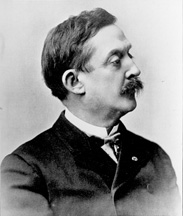Matthew Quay
| Matt Quay | |
|---|---|
 |
|
|
United States Senator from Pennsylvania |
|
|
In office January 16, 1901 – May 28, 1904 |
|
| Preceded by | Vacant |
| Succeeded by | Philander Knox |
|
In office March 4, 1887 – March 4, 1899 |
|
| Preceded by | John Mitchell |
| Succeeded by | Vacant |
| Chair of the Republican National Committee | |
|
In office July 12, 1888 – September 8, 1891 |
|
| Preceded by | Benjamin Jones |
| Succeeded by | James Clarkson |
| Personal details | |
| Born |
Matthew Stanley Quay September 30, 1833 Dillsburg, Pennsylvania, U.S. |
| Died | May 28, 1904 (aged 70) Beaver, Pennsylvania, U.S. |
| Political party | Republican |
| Education | Washington and Jefferson College (BA) |
| Military service | |
| Allegiance |
|
| Service/branch |
|
| Years of service | 1861–1864 |
| Rank | Colonel |
| Unit | 134th Pennsylvania Infantry |
| Battles/wars | American Civil War |
Matthew Stanley "Matt" Quay (September 30, 1833 – May 28, 1904) was a Pennsylvania political boss once dubbed a "kingmaker" by President Benjamin Harrison.
Quay was born in Dillsburg, and graduated from the institution now known as Washington and Jefferson College. He studied law, was admitted to the bar, and began to practice in 1854.
During the American Civil War, he served in the Union Army as a member of the 134th Pennsylvania Infantry Regiment, which he commanded as a colonel. Quay received the Medal of Honor for heroism at the battle of Fredericksburg. He later served as the Pennsylvania Militia's assistant commissary general, and as a personal assistant to Governor Andrew Curtin.
Quay's attention soon focused on politics, and he served in the Pennsylvania House of Representatives from 1865 to 1867. He later served as Secretary of the Commonwealth, Philadelphia County Recorder, and Pennsylvania Treasurer. Quay served in the United States Senate twice, the first time from 1887 to 1899, and the second from 1901 until his death in 1904.
From 1888 to 1891, Quay was Chairman of the Republican National Committee. As a party "boss" at the state and national levels, Quay had the ability to influence the selection of Republican nominees and the general election support they received; he was largely credited with the leadership of Benjamin Harrison's successful campaign for president in 1888.
...
Wikipedia
